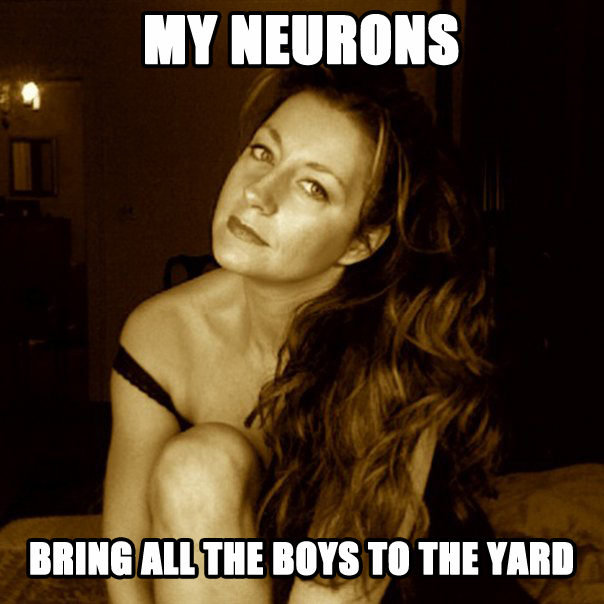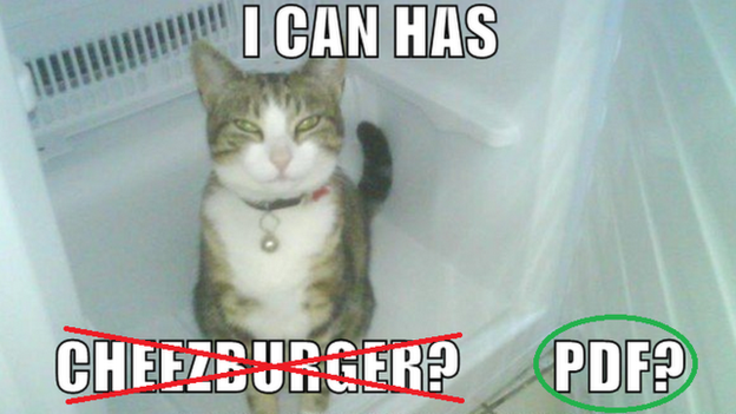How scientists using Twitter download research for free
If you are a scientist, and you need to get the results of a certain study for work, then you have two ways: either you pay thirty dollars for it, or write on Twitter a message with a “magic” hashtag, research identification code and email address.
I checked. Within half an hour after my tweet, I received the document by mail. Shecanhazpdf account retweeted my message , the description of which says: “Since 2014, he has been doing nothing but #icanhazpdf retweets all day.”
According to unspoken rules, a tweet needs to be deleted, but I will not do this - I specifically gave a link to a document that does not require a subscription. Therefore, I received a letter with the phrase: "The file is accessible to me without a login, but still I attach it to the letter."
Andrea Kuzhevsky - a scientist who came up with to distribute the work using Twitter. Photos from Google+
Scientists use Twitter for research. Recently, a team of scientists and IT experts from several American and British universities and Microsoft Research found a link between the content and emotional color of Twitter messages and user revenue . Previously, psychologists proved that negative emotions lead to heart disease . Twitter allows you to identify box office grossing new films or create maps of incidents, resources and people - rescuers searched for disaster victims in Haiti .
But scientists have found another way to use Twitter for their work. They promote piracy through a “secret” hashtag, which is no longer a secret thanks to the BBC .
In many countries, it is forbidden to download copyrighted material, including music tracks, films, books. Scientific research is also protected by law. These documents are available to scientists and institutes that have a subscription. But some scientists do not want to pay for knowledge, and they believe that access to such documents should be free and accessible to everyone. Therefore, they share the results of research among themselves.
The hashtag was launched by the scientist and writer Andrea Kuszewski, engaged in cognitive science. The hashtag #icanhazpdf is a paraphrased version of the I can haz meme. To get a document, you need to write a tweet with a link to the desired file, a hashtag and an email address. The user will soon receive a document to this address from a person who has paid access to it. After receiving the file, the tweet needs to be deleted. So academics from developing countries can access an extensive knowledge base of various institutes and research groups.

Publishers are against, and their right is enforced by law. They consider such behavior of scientists immoral. Kuzhevsky does not agree with this. She is confident that this hashtag will change the situation with the publication of studies and access to them: "If we continue to search and transmit research to people for free, and enough people support this idea, something will definitely change."
Academic piracy does not end with this hashtag. There are many services in which you drive a job number in the search line and download the document for free, often illegally. The German publishing company The Lancet and many other medical and scientific journals are now suing a similar pirate site - Sci-Hub.
Sci-Hub resource founded by Kazakh scientist Alexandra Elbakyan. The site is used by tens of thousands of people daily, many from Russia and India. Elbakyan says she doesn’t care about the lawsuit in the United States that The Lancet has filed, and that Sci-Hub’s activities are not theft. Elbakyan believes piracy is production! The Criminal Code contains separate articles 158 “Theft” and 146 “Violation of copyright and related rights”. So piracy can no longer be called theft, otherwise why do different laws for the same crime. On the semantic side of the issue, piracy is the copying of information, in which the product - information - becomes larger, while with theft from one subject the subject disappears, and from the second it appears: “These are fundamentally important differences! A well-known saying attributed to Buddha says: “Thousands of candles can be lit from a single candle, and her life will not be shorter. Happiness does not diminish when you share it. ”You can add that information does not diminish when it is copied. On the contrary: it’s getting bigger. ”
The music industry has changed after many years of downloading songs from pirated sites - streaming services have appeared that reduce the cost of listening, copyright holders have become more loyal to users. Sometimes they simply do not pursue violators, because they are sure that when someone downloads an album and listens to it, there is a greater chance that this album will be bought. The same with books. And if in 2011 80% of Russians were not ready to give up pirated content , then in 2014 users paid 6.7 billion rubles for videos, music and books .
The spread of research may be the same fate - already now some publishers have begun to reduce the prices of legal access to them. Kuzhevsky is confident that these changes will not happen quickly. But you can speed them up.
I checked. Within half an hour after my tweet, I received the document by mail. Shecanhazpdf account retweeted my message , the description of which says: “Since 2014, he has been doing nothing but #icanhazpdf retweets all day.”
According to unspoken rules, a tweet needs to be deleted, but I will not do this - I specifically gave a link to a document that does not require a subscription. Therefore, I received a letter with the phrase: "The file is accessible to me without a login, but still I attach it to the letter."
Will you help? #icanhazpdf https://t.co/X1R1trWtGQ sychev.ip@gmail.com
- Ivan Sychev (@ivan_sychev) October 24, 2015
Andrea Kuzhevsky - a scientist who came up with to distribute the work using Twitter. Photos from Google+
Scientists use Twitter for research. Recently, a team of scientists and IT experts from several American and British universities and Microsoft Research found a link between the content and emotional color of Twitter messages and user revenue . Previously, psychologists proved that negative emotions lead to heart disease . Twitter allows you to identify box office grossing new films or create maps of incidents, resources and people - rescuers searched for disaster victims in Haiti .
But scientists have found another way to use Twitter for their work. They promote piracy through a “secret” hashtag, which is no longer a secret thanks to the BBC .
In many countries, it is forbidden to download copyrighted material, including music tracks, films, books. Scientific research is also protected by law. These documents are available to scientists and institutes that have a subscription. But some scientists do not want to pay for knowledge, and they believe that access to such documents should be free and accessible to everyone. Therefore, they share the results of research among themselves.
The hashtag was launched by the scientist and writer Andrea Kuszewski, engaged in cognitive science. The hashtag #icanhazpdf is a paraphrased version of the I can haz meme. To get a document, you need to write a tweet with a link to the desired file, a hashtag and an email address. The user will soon receive a document to this address from a person who has paid access to it. After receiving the file, the tweet needs to be deleted. So academics from developing countries can access an extensive knowledge base of various institutes and research groups.

Publishers are against, and their right is enforced by law. They consider such behavior of scientists immoral. Kuzhevsky does not agree with this. She is confident that this hashtag will change the situation with the publication of studies and access to them: "If we continue to search and transmit research to people for free, and enough people support this idea, something will definitely change."
Academic piracy does not end with this hashtag. There are many services in which you drive a job number in the search line and download the document for free, often illegally. The German publishing company The Lancet and many other medical and scientific journals are now suing a similar pirate site - Sci-Hub.
Sci-Hub resource founded by Kazakh scientist Alexandra Elbakyan. The site is used by tens of thousands of people daily, many from Russia and India. Elbakyan says she doesn’t care about the lawsuit in the United States that The Lancet has filed, and that Sci-Hub’s activities are not theft. Elbakyan believes piracy is production! The Criminal Code contains separate articles 158 “Theft” and 146 “Violation of copyright and related rights”. So piracy can no longer be called theft, otherwise why do different laws for the same crime. On the semantic side of the issue, piracy is the copying of information, in which the product - information - becomes larger, while with theft from one subject the subject disappears, and from the second it appears: “These are fundamentally important differences! A well-known saying attributed to Buddha says: “Thousands of candles can be lit from a single candle, and her life will not be shorter. Happiness does not diminish when you share it. ”You can add that information does not diminish when it is copied. On the contrary: it’s getting bigger. ”
The music industry has changed after many years of downloading songs from pirated sites - streaming services have appeared that reduce the cost of listening, copyright holders have become more loyal to users. Sometimes they simply do not pursue violators, because they are sure that when someone downloads an album and listens to it, there is a greater chance that this album will be bought. The same with books. And if in 2011 80% of Russians were not ready to give up pirated content , then in 2014 users paid 6.7 billion rubles for videos, music and books .
The spread of research may be the same fate - already now some publishers have begun to reduce the prices of legal access to them. Kuzhevsky is confident that these changes will not happen quickly. But you can speed them up.
